Van lifers reveal 11 things everyone should know before committing to the lifestyle
Sophie-Claire Hoeller

- Van life is exploding in popularity as people search for safe ways to travel during the pandemic.
- However, not everyone is made for the minimalist lifestyle, and living in such a small space can be hard on couples.
- Van life means a lot of time spent fixing things that are broken.
- Finding free camping, as well as resources such as fresh water, can be time-consuming.
Van life has captured the public imagination.
Who doesn't dream of a simpler, cheaper life that takes you from one gorgeous spot to another, sleeping and working where you please and waking up to stunning views?
However, the reality is a little more complicated.
While the many long-term van lifers Insider spoke to adore the lifestyle, they're aware it also presents a few challenges that might not make it for everyone.
Below, seven van-life couples share a few of the surprising struggles they've faced.
Working productively can sometimes be a challenge.
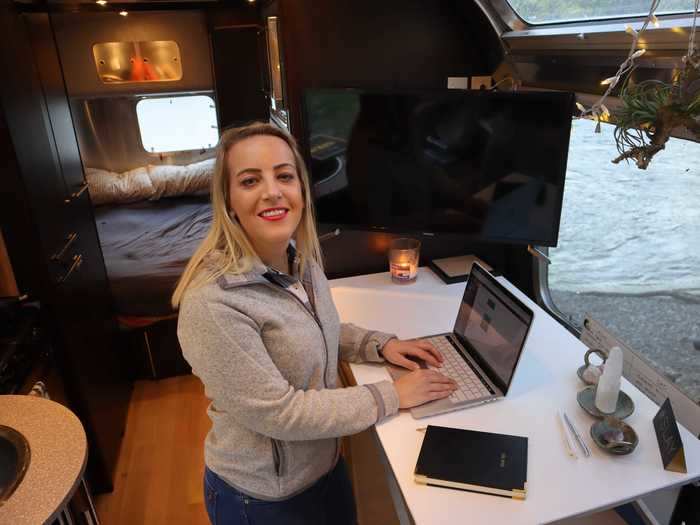
Heather DeSantis, who lives and runs her virtual PR agency from a 23-foot Airstream trailer, previously told Insider that reliable internet is the "number one" thing that stresses her out about van life.
While she says she loves the freedom and flexibility of running her own business from the road, not having a steady internet connection can often throw a wrench in the works.
It's not just the internet that poses a challenge. As Eamon Fitzgerald and Rebecca Moroney, a Canadian couple that's been living in a van since 2017, have come to find, even the most basic daily tasks can take a surprising amount of time.
"Some of the many obstacles of van life for us are finding ways to work productively while on the road, the stress of constantly moving, finding free camping, and keeping both the house and ourselves clean," they told Insider. "Of course, there are solutions to all of these and the longer you are on the road the better you get at establishing daily and weekly routines that work for you."
Despite van life seemingly being all about freedom and flexibility, a lot of time is spent getting organized and planning ahead.
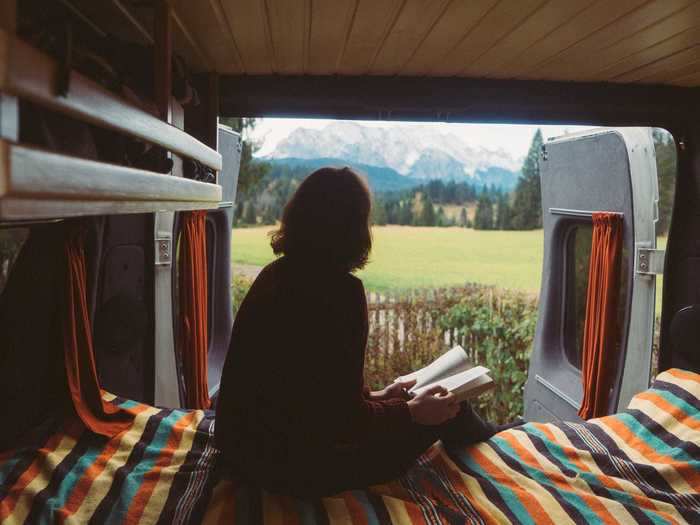
Aaron Holmes, DeSantis' fiancé, says that it takes a surprising amount of time to plan their next move, pack up, and drive. He estimates spending around an hour or two a day planning their next stop.
"One of the sacrifices that you make having this lifestyle is you give up some of your time for logistics and moving around," Holmes said. "Your schedule is definitely not the same as it would be. Weekends are less of a thing."
Vans can need a lot of maintenance.
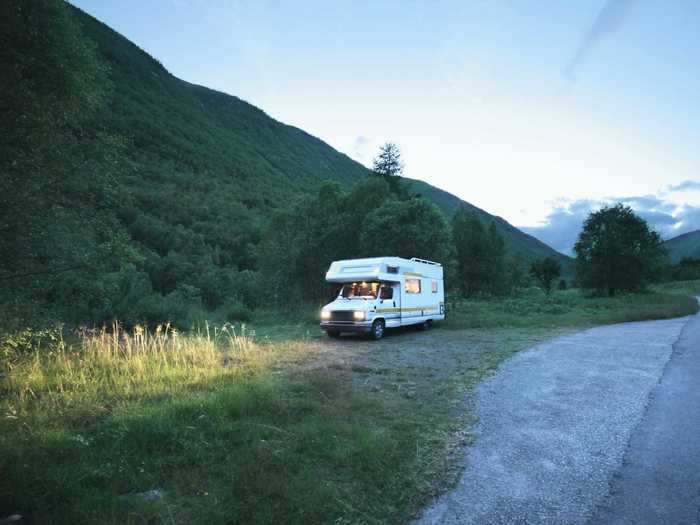
"I'm pretty sure everyone I know that lives van or bus life has broken down on more than one occasion and has been stranded places," Tyler Hjorting, who traversed the country in a converted school bus with his girlfriend Lexi O'Brien, previously told Insider.
Hjorting adds that plumbing issues, leaks, or losing power altogether can also be issues.
However, it's not just the van itself that breaks down.
Natalie and Abigail Rodriguez, who have been documenting their travels on their YouTube channel Let's Play Ride & Seek since 2018, said things inside their van often break.
"We heard a quote once, 'Van life is fixing things in pretty places.' This is so true. We are constantly making little home repairs," they said. "From fixing a broken bolt on a fan, tightening screws in the cabinets and repairing loose electrical wires, there is always something in need of repair!"
If something is seriously wrong with the van, you could be left with no place to go.
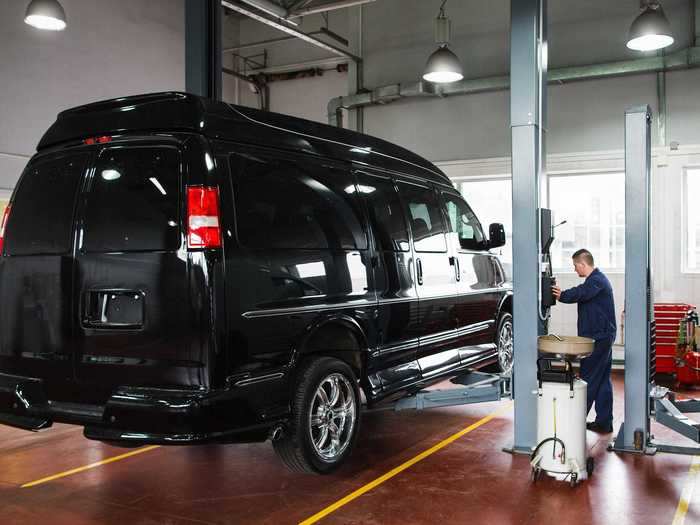
"Mechanical repairs or maintenance is an issue," the Rodriguezes said.
"When your vehicle is your home, you are left with nowhere to go when it needs repairs," they added.
Driving a van, converted school bus, or RV can be stressful — especially in a city.

Hjorting said driving made him feel "stressed" because the bus was so big and difficult to maneuver, but also because it was always making loud noises and overheated easily.
He said that on hills, he'd have to slow down to about 20 miles per hour, creating a huge line of frustrated drivers behind him.
Driving wasn't any easier in the city.
"Driving a bus in a city was really hard because of how big we were," O'Brien said, adding that they would often avoid driving it into a city altogether.
"We weren't able to really see a lot of cities unless we Ubered or rode our bikes in," she added.
You're in charge of your own amenities.
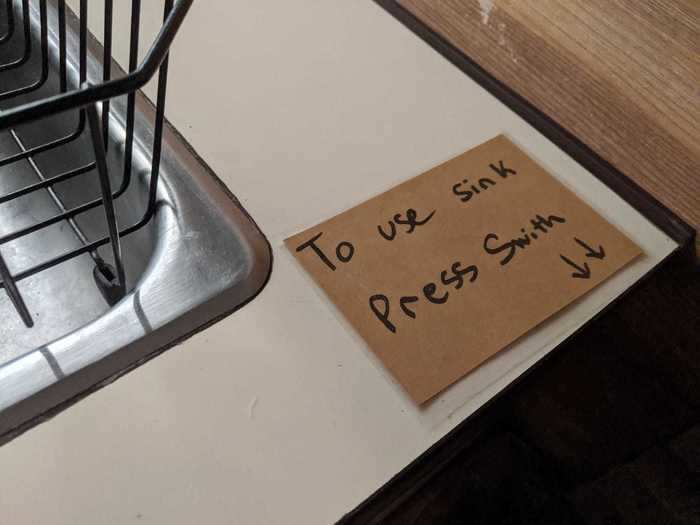
Unless you're hooked up to water and power in an RV park, you have to find your own.
"Van life looks awesome on Instagram and while it is awesome in real life, it also comes with challenges," the Rodriguezes said. "You've got to be willing to put in work. Your water doesn't just run from the faucet, you have to find it and put it in your tank. Sometimes we drive over an hour to find water."
You have to replenish resources frequently.
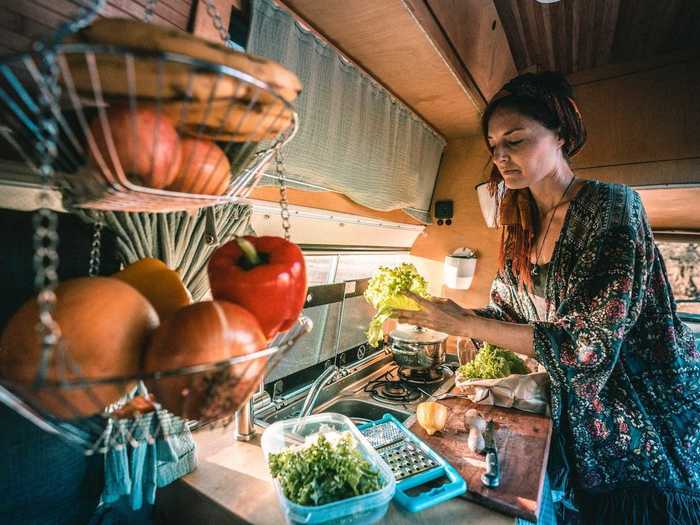
Van lifers must not only replenish their water tanks; they also need to dump sewage tanks, refuel, occasionally top up on power, and buy groceries.
Living within a small square footage, stocking up on fresh water and food is a more frequent undertaking, since both water tanks and fridges are usually compact in that size space.
"If you decided to van life after living in a regular house it might be hard at first to adjust to having to replenish resources that you might not have had to think about before," the Rodriguezes said. "Water, food, and even power can become low at times, although we adapted very fast to fetching water and chasing Wi-Fi."
Campgrounds and RV parks can cost anywhere from $30 to over $100 a night, but finding free places to camp can be tricky and time-consuming.
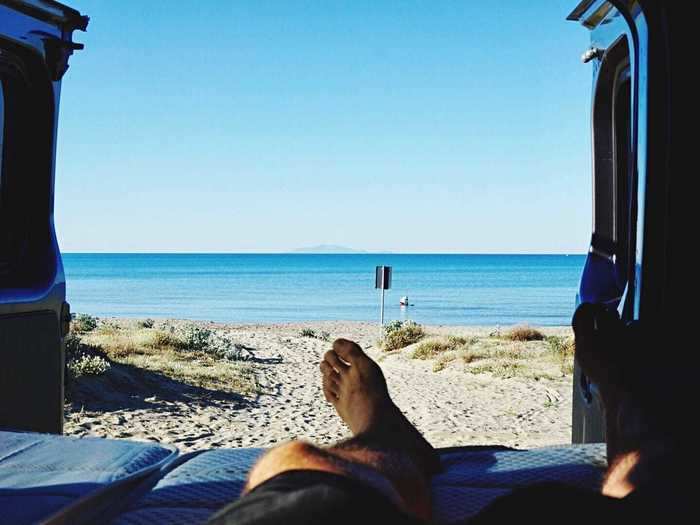
"You have to be willing to sometimes spend hours trying to find a camp spot," the Rodriguezes said of finding free and legal places to spend the night.
"Traveling in areas without a lot of public lands is hard," they added, speaking of the main areas where vans and RVs can park for free. "We didn't enjoy living in the van on the East Coast as much because we'd often end up staying the night in parking lots. This is the unglamorous side of van life."
Van life can be lonely at times.
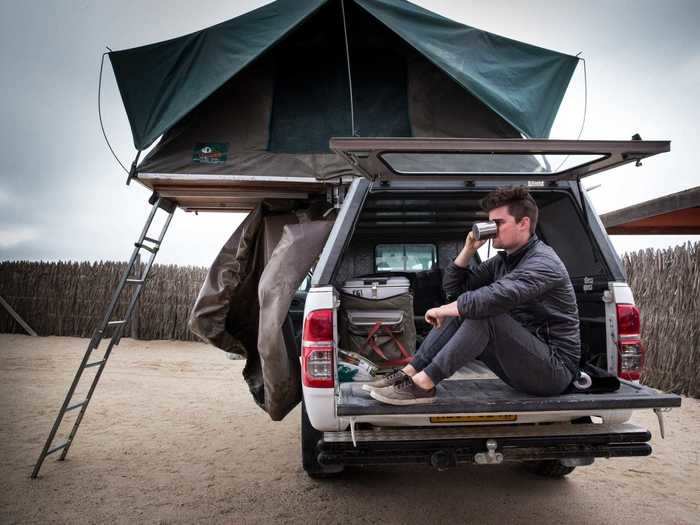
While most van lifers we spoke to raved about the many like-minded people they met on the road, and the lifelong friendships they made through the lifestyle, some lamented that constantly being on the move can be isolating.
"People need to know it isn't always as glorious as the social feeds lead you to believe. Tiny living is challenging, minimalism isn't for everyone, and if you travel as much as we do you can feel isolated from your community," Ben Jamin and Leah Airey said.
The couple, who has spent the last three years traveling the world in a van, documenting their adventures on the YouTube channel Kombilife, added: "Just like most things in life, the key to making van life a success is balance."
DeSantis said she and her fiancé have sacrificed a lot to live this way.
"One of the things we miss the most is the community aspect of just having our friends to go out on date night with," she said, adding that most people they encounter on the road are much older.
"You feel lonely, to be super transparent. It can feel lonely building a business and living in an Airstream, but we wanted to have this experience while we were still young, and go on hikes and see the amazing things that this country has to offer," she added.
Being in such a small space with your partner can be hard on a relationship.
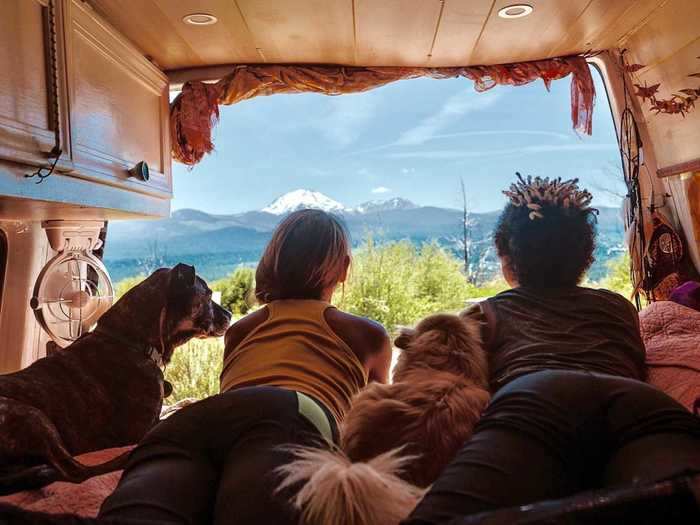
"If you're doing van life with a partner, be prepared to get close and learn how to communicate. Living in 90 square feet with your partner can take a toll on your relationship if you let it," the Rodriguezes said. "You've got to work together and be a team."
DeSantis, who not only lives with her fiancé but works with him, says knowing what's on your significant other's plate and understanding their stressors is key, "so you understand where your partner is coming from instead of getting agitated."
She and Holmes have instituted "daily alignments," where they review their intentions for the day every morning, so they stay on the same page.
Moroney says that it just takes time to get used to.
"It took time for us to learn, quite literally, how to avoid stepping on each other's toes in such a tight and tiny space," she said. "Give it time!"
It's not always as glamorous as it looks on social media.

Sara James, who converts vans into tiny homes on wheels with her husband, Alex, and who spent two years living in a van with him, previously told Insider that van life is "not as glamorous as it looks on Instagram by any means."
"A lot of the time you're sleeping at a truck stop or rest area, a hotel parking lot, wherever you can find sometimes," she added. "We've slept in Walmart parking lots before."
While she says daytime often resembles Instagram — parking your van directly by a beautiful lake or on a beach before taking a dip — nighttime is a different reality, as it isn't legal to park just anywhere.
"It's so important to remember that what we see on Instagram when searching #vanlife is a highlight reel," Fitzgerald and Moroney said. "Like anything, this lifestyle comes with a set of pros and cons. But if you enjoy living simple and keep an open mind, we really think the pros far outweigh the cons."
- Read more:
- A couple turned an old school bus into a gorgeous tiny home, and now they live in the 185-square-foot space full-time
- A nurse working to fight the coronavirus in California lives in a 75-square-foot van with his wife and 2 cats
- A couple quit their jobs and sold everything to live in a van. Now, they make money by building tiny homes on wheels for others.
- I spent a single night in a camper van with my husband and have a newfound appreciation for people who do it full-time
READ MORE ARTICLES ON
Popular Right Now
Popular Keywords
Advertisement